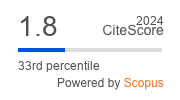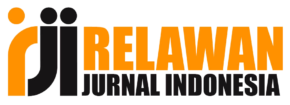Sistem Pemeringkat Otomatis Berbasis Kata Sifat
Abstract
This paper exposes a novel method has been developed during these 2 years. The method is named as “adjective based automatic rating system”. This method is developed to utilize the abundant availability of text on the internet for quality and performance rating purpose. The text is processed in such a way and leave only the adjectives. Semantic analysis is done by two knowledge: adjectives of performance definition and Indonesian adjectives database with its synonym-antonym relation. This research proposes several formula steps, therefore the method output is a rating score that can be tunned its scale. The experiment results have been gathered for several objects: tourism, courier service, and organization performance. With detail information in tourism object experiment, this paper cites the other experiment results as well. This paper also provides availability information of the method as Python library. The results show a high correlation score, always more than 0.9. The results also show acceptable error scores, never more than 45%.
Downloads
References
[2] Katadata.co.id, “Jumlah Penduduk Indonesia 2019 Mencapai 267 Juta Jiwa,” 2019. [Online]. Available: https://databoks.katadata.co.id/datapublish/2019/01/04/jumlah-penduduk-indonesia-2019-mencapai-267-juta-jiwa.
[3] B. Pan, T. MacLaurin, and J. C. Crotts, “Travel Blogs and the Implications for Destination Marketing,” J. Travel Res., vol. 46, no. 1, pp. 35–45, 2007.
[4] B. Pang and L. Lee, “Opinion Mining and Sentiment Analysis,” Found. Trends Inf. Retr., vol. 2, no. 1–2, pp. 1–135, Jan. 2008.
[5] M. Jabreel, A. Moreno, and A. Huertas, “Semantic comparison of the emotional values communicated by destinations and tourists on social media,” J. Destin. Mark. Manag., vol. 6, no. 3, pp. 170–183, 2017.
[6] D. M. Ramadhani, C. Rahmad, and F. Rahutomo, “Tourism destination pemeringkat system based on social media analysis (proposal and dataset development in Indonesian language),” in 2017 International Conference on Sustainable Information Engineering and Technology (SIET), 2017, pp. 41–46.
[7] F. Rahutomo, Z. H. R. Adi, I. F. Rozi, and P. Y. Saputra, “Implementasi Text Mining Pada Website/Blog Di Internet Untuk Menilai Kinerja Suatu Organisasi,” Inovtek Polbeng Seri Inform., vol. 3, no. 2, pp. 101–109, 2018.
[8] F. Rahutomo, I. P. Hidayati, P. Y. Saputra, I. F. Rozi, U. Nurhasan, and D. M. Ramadhani, “Automatic Pemeringkat System for National Delivery Services,” in 2018 International Conference on Applied Science and Technology (iCAST), 2018, pp. 226–230.
[9] M. E. R. Putra, F. Rahutomo, and Y. Pramitarini, “Pengembangan Library Sistem Pemeringkat Otomatis Berbasis Kata Sifat,” J. Inform., vol. 6, no. 2, 2019.
[10] M. E. R. Putra, F. Rahutomo, and Y. Pramitarini, “Sistem Pemeringkat Otomatis Berbasis Kata Sifat,” 2019. [Online]. Available: https://pypi.org/project/PySpoks/.
[11] M. E. R. Putra, F. Rahutomo, and Y. Pramitarini, “Library Sistem Pemeringkat Otomatis Berbasis Kata Sifat,” 2019. [Online]. Available: https://github.com/ElfanRodh/PySpoks.
[12] E. Costa et al., “A framework for building web mining applications in the world of blogs: A case study in product sentiment analysis,” Expert Syst. Appl., vol. 39, no. 5, pp. 4813–4834, 2012.
[13] G. A. Miller, “WordNet: A Lexical Database for English,” Commun. ACM, vol. 38, no. 11, pp. 39–41, Nov. 1995.
[14] F. Rahutomo and E. Rohadi, “Pengembangan Piranti Penelitian Sistem Temu Kembali Informasi Bahasa Indonesia,” in Seminar Nasional Sistem Informasi Indonesia (SESINDO), 2015, pp. 313–319.
[15] D. Zamzami, F. Rahutomo, and D. Puspitasari, “Aplikasi Wordnet Indonesia Berdasarkan Kamus Thesaurus Bahasa Indonesia menggunakan Algoritma Rule Based Text Parsing,” in Seminar Informatika Aplikatif Polinema, 2016.
[16] P. Bahasa, Kamus Tesaurus Bahasa Indonesia. Departemen Pendidikan Nasional, 2008.
Copyright (c) 2019 Jurnal RESTI (Rekayasa Sistem dan Teknologi Informasi)

This work is licensed under a Creative Commons Attribution 4.0 International License.
Copyright in each article belongs to the author
- The author acknowledges that the RESTI Journal (System Engineering and Information Technology) is the first publisher to publish with a license Creative Commons Attribution 4.0 International License.
- Authors can enter writing separately, arrange the non-exclusive distribution of manuscripts that have been published in this journal into other versions (eg sent to the author's institutional repository, publication in a book, etc.), by acknowledging that the manuscript has been published for the first time in the RESTI (Rekayasa Sistem dan Teknologi Informasi) journal ;








